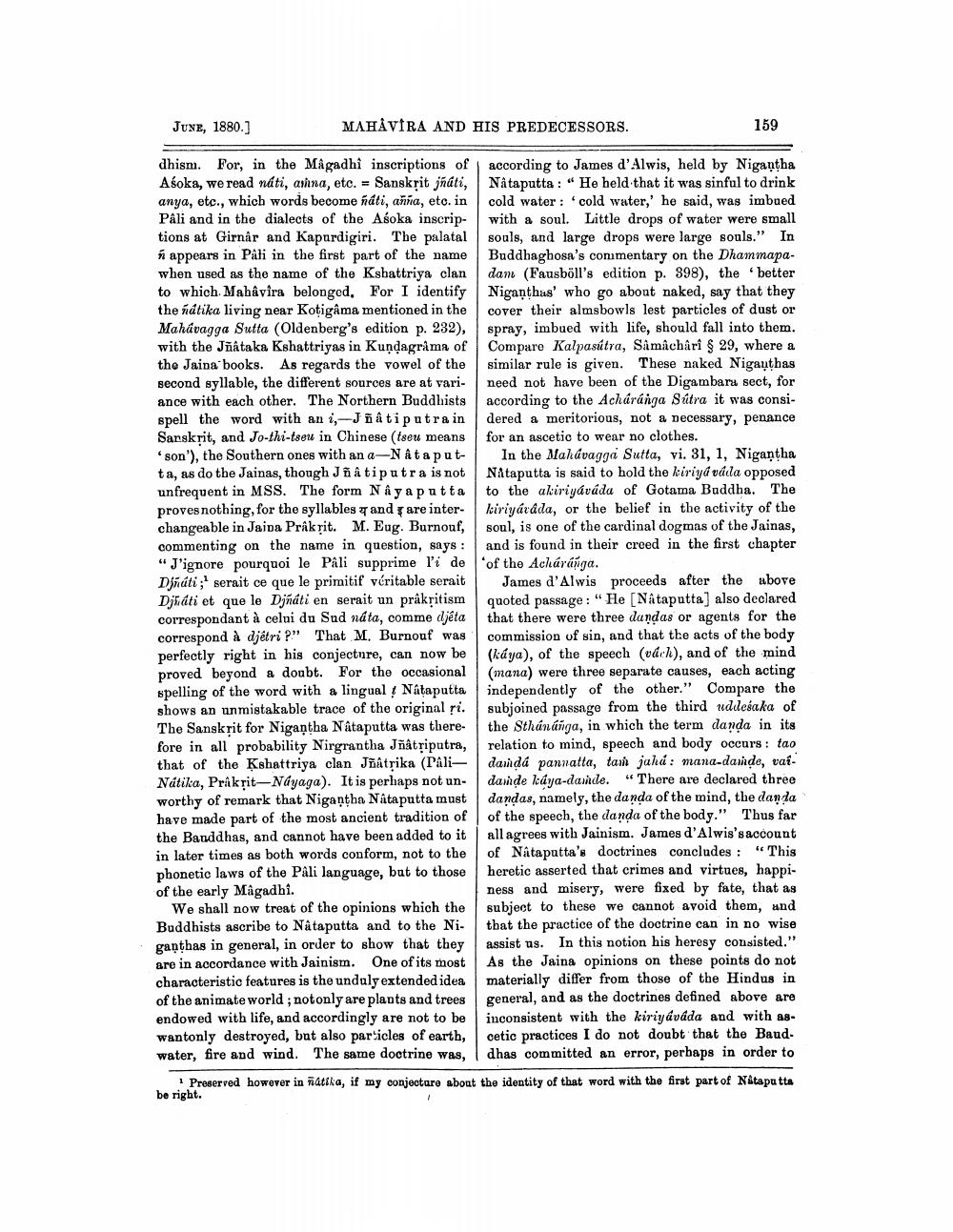________________
JUNE, 1880.]
MAHÅVIRA AND HIS PREDECESSORS.
159
dhism. For, in the Màgadhỉ inscriptions of according to James d'Alwis, held by Nigantha Asoka, we read náti, anna, etc. - Sanskrit jñāti, Nå taputta: "He held that it was sinful to drink anya, etc., which words become ñáti, añía, etc. in cold water : cold water,' he said, was imbued PAli and in the dialects of the Asoka inscrip- with a soul. Little drops of water were small tions at Girnår and Kapurdigiri. The palatal souls, and large drops were large souls." In h appears in Pali in the first part of the name Buddhaghosa's conimentary on the Dhammapawhen used as the name of the Kshattriya clan dam (Fausböll's edition p. 398), the better to which Mabâvira belonged. For I identify Niganthas' who go about naked, say that they the natika living near Kotigâma mentioned in the cover their almsbowls lest particles of dust or Mahávagga Sutta (Oldenberg's edition p. 232), spray, imbued with life, should fall into them. with the Jñataka Kshattriyas in Kundagrama of Comparo Kalpasútra, Samachari & 29, where a the Jaina books. As regards the vowel of the similar rule is given. These naked Niganthas second syllable, the different sources are at vari- need not have been of the Digambara sect, for ance with each other. The Northern Buddhists according to the Acháránga Sútra it was consispell the word with an i,- Jñatiputra in dered a meritorious, not a necessary, penance Sanskrit, and Jo-thi-tseu in Chinese (tseu means for an ascetic to wear no clothes.
son'), the Southern ones with an a-Nâtaput- In the Mahávagga Sutta, vi. 31, 1, Nigantha ta, as do the Jainas, though J ñ â tiputra is not Nataputta is said to hold the kiriyá vádla opposed unfrequent in MSS. The form Naya putta to the akiriyaváda of Gotama Buddha. The proves nothing, for the syllables and are inter- kiriyavada, or the belief in the activity of the changeable in Jaipa Prakrit. M. Eug. Burnouf, soul, is one of the cardinal dogmas of the Jainas, commenting on the name in question, says: and is found in their creed in the first chapter “ J'ignore pourquoi le Pali supprime l'i de l'of the Acháranga. Djñáti;' serait ce que le primitif véritable serait James d'Alwis proceeds after the above Djsiáti et que le Djñáti en serait un prâkritism quoted passage: "He (Nataputta) also declared correspondant à celui du Sud náta, comme djęta that there were three dandas or agents for the correspond à djétri P." That M. Burnout was commission of sin, and that the acts of the body perfectly right in his conjecture, can now be (kdya), of the speech (vdel), and of the mind proved beyond a doubt. For the occasional (mana) were three separate causes, each acting spelling of the word with a lingual Nataputta independently of the other." Compare the shows an unmistakable trace of the original ri. subjoined passage from the third uddesaka of The Sanskrit for Nigantha Nataputta was there. the Sthánúnga, in which the term danda in its fore in all probability Nirgrantha Jñatriputra, relation to mind, speech and body occurs : tao that of the Ķshattriya clan Jñatrika (Ali-| daudá pannatta, tam jaha: mana-dande, vai. Nátika, Prakrit-Nayaga). It is perhaps not un- dande kaya-dande. “There are declared three worthy of remark that Nigantha Nataputta must dandas, namely, the danda of the mind, the danda have made part of the most ancient tradition of of the speech, the danda of the body." Thus far the Banddhas, and cannot have been added to it all agrees with Jainism. James d'Alwis's account in later times as both words conform, not to the of Natapatta's doctrines concludes: "This phonetic laws of the Pali language, but to those heretic asserted that crimes and virtues, happiof the early Mâgadhi.
ness and misery, were fixed by fate, that as We shall now treat of the opinions which the subject to these we cannot avoid them, und Buddhists ascribe to Nataputta and to the Ni- that the practice of the doctrine can in no wise ganthas in general, in order to show that they assist us. In this notion his heresy consisted." are in accordance with Jainism. One of its most As the Jaina opinions on these points do not characteristic features is the unduly extended idea materially differ from those of the Hindus in of the animate world ; notonly are plants and trees general, and as the doctrines defined above are endowed with life, and accordingly are not to be inconsistent with the kiriy dvdda and with 98wantonly destroyed, but also particles of earth, cetic practices I do not doubt that the Baud. water, fire and wind. The same doctrine was, dhas committed an error, perhaps in order to
Preserved however in nattka, if my conjectare about the identity of that word with the first part of Nataputta be right.




